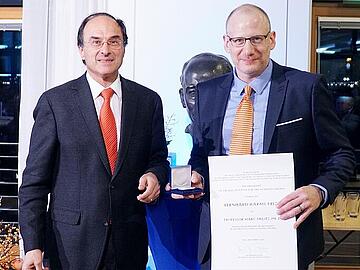Media information
Trade Economist Marc Melitz Wins Bernhard Harms Prize

American trade economist Marc Melitz of Harvard University was today awarded the Bernhard Harms Prize by the Kiel Institute for the World Economy (IfW). The prize is worth EUR 25,000 and was presented by the President of the Kiel Institute, Prof. Dennis Snower. “In Marc Melitz, we are honoring an economist who has made a very valuable contribution to the research of global economic relationships and global economic cooperation,” said Snower on presenting the award. “Thanks to his work, we now understand the conditions that determine when companies are restricted to their domestic market, when they begin to export, and when they establish a presence in other countries. We understand why companies with the same products and the same target groups operate in totally different ways on the global stage, and we have a better idea of the extent to which international trade can strengthen the market position and productivity of a company in its home country.” Melitz’s 2003 paper The Impact of Trade on Intra-Industry Reallocations and Aggregate Industry Productivity, originally published in the prestigious journal Econometrica, is one of the most widely referenced works in recent decades, with over 10,000 academic citations. The Melitz model presented in the paper is now a cornerstone of modern international trade theory.
"I am very honored to see my name on a list with so many inspiring recipients of the Bernhard Harms Prize,” said Melitz at the award ceremony. Addressing the Brexit vote in the UK and the election of Donald Trump, Melitz warned of negative economic and social consequences: “The global economy is inter-connected by trade agreements as well as by supply chains that frequently now span across the world. Firms now face much greater uncertainty regarding how they will be treated when they engage in global markets and this will likely have a chilling effect on their investments. Even if the US stock market booms in anticipation of higher deficit spending, this will not lead to sustained growth. A protectionist trade regime will end up hurting most workers — including those it purports to help.”
The Kiel Institute introduced the biennial Bernhard Harms Prize in 1964. The award honors academics and practitioners for exceptional contributions to global economic research and the promotion of global economic relations, respectively. Recent winners of the Bernhard Harms Prize include the economists Abhijit Banerjee (2014), Gene Grossman (2012), Raghuram Rajan (2010), Kenneth Rogoff (2008), Robert Feenstra (2006), Maurice Obstfeld (2004), Stanley Fischer (2002), and Jeffrey Sachs (2000).
The award is named for Bernhard Harms, who founded the Kiel Institute in 1914.
Video:
You can watch the award ceremony and acceptance address by Marc Melitz on Periscope (https://www.periscope.tv/kielinstitute).
